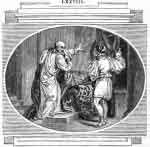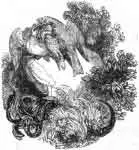Epictetus picked a fur coat with rare lynx on one side and lamb on the other. He wore the coat with the lamb showing. That way he could appear common.
For advantage hide things you don’t want known.

Northcote
Epictetus the Philosopher coming one day into a warehouse in which a great variety of things were sold, bid the young man of the shop show him some furred garments. They immediately brought him a variety of choice martins, ermines, sables, and others of great value; which not pleasing the philosopher, be told a sage-looking person who superintended the sale of the goods, that these furs were too rich, and not fit for his purpose; but he desired such a one as those for persons who wish to appear like honest men. This man of the world, when he knew the mind of Epictetus, took him by the hand, and led him aside into an inner room, and soon brought him out again, wrapt in a gown made of the skins of lynxes, and lined with lamb-skins. Now Epictetus had turned the lynxes’ skins, that were of great value, next to his body, and the lamb-skins outside: which the young man of the shop observing, ran after him, and told him he had put his garment on wrong; but was much out of countenance when the sage philosopher, after he had sufficiently laughed at his simplicity, gave him this answer: “You may know, perhaps, my young friend, how to put on a pair of buskins, but you have shewn yourself very ignorant in meddling with my fur. This gown I tell you must be worn as you see, with the lynxes’ skins inwards: nor should I ever compass my designs, if but a single hair of them were seen without.”
Application
This lesson of Epictetus sounds harsh; that the keen penetration into characters which is implied by the lynxes’ skin, should be entirely concealed, and that the world should notice the appearance of the innocent lamb alone, and yet the excellence of this lesson cannot be disputed. For it is very certain, that however far our sagacity may enable us to dive into the characters of men, and know their inmost thoughts and intentions, it will not tend to increase their love towards us, though it may their reverence and their fear. The best policy, in respect to our own good, is to be able to see all things and say nothing. Therefore it will do us most service if we show the lamb outside, and keep the lynx hid from sight, and for our own advantage alone. J. N.

